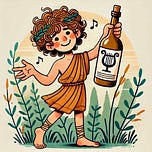The first in a series of Greek myths, I tell the tale with the accompaniment of the modern lute. Many of you are familiar with the story of the boy who flew too close to the sun, but may not remember the details of how Daedalus found himself under the control of the mighty King Minos, or why the King imprisoned Daedalus and his son, Icarus, in the first place.
Daedalus had a home in Athens, where he was celebrated for his inventions, but in a fit of jealousy, he murdered his brilliant nephew, throwing the boy from Athena’s temple to the ground below. Forced to flee Athens, he sailed across the sea to the island of Crete, ruled by King Minos, who could support his obsessive quest to create technology that could rival the gods.
While he was in Crete, he was approached by the queen, Pasiphaë, who was cursed by Poseidon to lust after a beautiful, red bull. He created an artificial cow for the queen to climb into, so that the bull could inseminate her. It was this unnatural union that birthed the Minotaur, which so angered King Minos that he imprisoned Daedalus in a tower.
Why did Daedalus agree to build the cow? In order to breach the realm of possibility, scientists ignore the limitations placed on them by man, by nature, and by the gods. While this ambition can result in groundbreaking discoveries that push humanity into the future, it can also summon monsters that devour the world.
Modern civilization is filled with Minotaurs, weapons that, with one breath, can melt entire countries. Daedalus would be jealous.
As a child, I related to the foolish Icarus who was so enamored by the thrill of flight that he forgot his father’s warning to stick to the middle path. I still have some Icarus in me, but nowadays I relate to Daedalus, whose hubris led to his son’s demise. I, too, feel shame and regret about how my pushing and pushing and pushing have hurt others around me.
At its heart, this story is about the gods punishing man for crossing divine boundaries. I wonder if our civilization will suffer the same fate. Will our children will be the ones to suffer from the hubris of our relentless push into new technologies that dehumanize and enslave our minds? All the while, the partridge will watch in horror.
Here are some Mantinades inspired by the ancient story:
Within the partridge eye, a churning inferno glows like wine,
man will burn his own rusted vine, pierced by tusks from lying swine.
Squealing, savior! will not save us from the drowning molten wax,
neither will mourning inventors stymie the tarred wing's collapse.
From olympus, the gods look down on man's ingenuity,
a concubine who births new horrors in perpetuity.
Icarus! I cry, where is the smile of my beloved son?
below the radiant waves of the minotaur's megaton.
If you liked this, check out:
The Fox Woman and the Hunter
The second in a series, this story is another ancient tale with timeless lessons to impart. I recite the narrative from memory with the accompaniment of the modern lute, and I include a poem, which was inspired by another woman, who is also part fox, part human, and part spirit of the forest:










Share this post